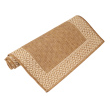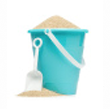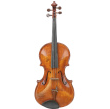Practical Tips to help young writers with story writing
The Tutor Master is able to provide help and advice to parents and students to develop story-writing skills. Read the frequently asked questions below followed by examples of stories produced by young writers using the tutormaster books as study aids.
Frequently asked Questions
- Why does my child struggle with story writing?
- My child lacks the imagination to come up with ideas for their stories. What can I do?
- How can I help my child to structure stories in an organised way, from beginning to end?
- My child lacks the ideas and inspiration to complete stories, tending to leave them unfinished. How can I help?
- How can I encourage my child when they feel intimidated by the technical demands of writing; spelling, punctuation and grammar, and are put off from getting started?
- When faced with a blank piece of paper, my child feels unable to begin and tends to give up before they've started. What can I try that may help?
- What can I do to help prepare my child to write a story under, timed, examination conditions?
- Can you suggest some key ingredients that will help improve my child's writing?
Why does my child struggle with story writing?
Young writers struggle with story writing for a variety of reasons. From his experience of over 30 years working with children, the Tutor Master has identified some of the main reasons and these are addressed in his books 'Tutor Master helps you Write Stories Books One' & 'Tutor Master helps you Write Stories Book Two'.
My child lacks the imagination to come up with ideas for their stories. What can I do?

As a parent, you should try to provide opportunities for your child to enjoy a variety of experiences. School visits, holidays organised by school, holiday visits to the park, adventure playground, museums, zoos and shows can all help to widen the horizons for children and provide them with experiences to stimulate their imaginations.
By writing stories based on their experiences, beginner writers can develop confidence and writing skills. These can lead them towards extending their imagination and ideas to tackle a wider range of story types. 'Tutor Master helps you Write Stories Books One' & 'Tutor Master helps you Write Stories Book Two' each contain 20 structured story plans to enable children to write about their own experiences and turn them into entertaining stories.
How can I help my child to structure stories in an organised way, from beginning to end?

Practising story writing on a regular basis enables young writers to develop and extend their skills, as well as developing their self-confidence. With practice, this confidence is expressed by writing stories that are well structured and contain the key ingredients that make stories interesting, entertaining and readable. Eleven of the key ingredients for writing good stories are contained in, 'Tutor Master helps you Write Stories Book 1'.
Tutor Master believes that in order to become confident writers, it is important to understand that children (indeed all of us) have stories to tell. Young writers need to be proud of their stories and feel that they are of interest, worth and value. Adopting an approach that is based on their experiences is very helpful to young writers, as they know how their story will begin, what will happen and how the story will end.
My child lacks the ideas and inspiration to complete stories, tending to leave them unfinished. How can I help?
'Tutor Master helps you Write Stories Books One' & 'Tutor Master helps you Write Stories Book Two' each contain 20 structured story plans. These provide young writers with ideas to complete the beginning, middle and end of their stories. When children are unsure how to continue, the - 'Help mum/dad I don't know what to write next'- moments can be alleviated as the structured story plans help provide ideas to assist the progress of the story.
How can I encourage my child when they feel intimidated by the technical demands of writing; spelling, punctuation and grammar, and are put off from getting started?

Most adults draft pieces of written work, whether this is on the computer or in longhand on a blank sheet of paper. Young writers too can benefit from drafting their work, and then self-correcting it, or having work corrected by a peer or adult, before producing a final (best) copy that reflects their efforts and which they can be proud of. Correcting written work can address some of the technical issues of spelling, punctuation and grammar before a final best copy is produced. The best copy can be a model, which provides a template for future writing. For more detailed advice on the technical skills involved with story writing see, 'Tutor Master helps you Learn English – A Literacy Dictionary.'
The Tutor Master encourages students to collate all their best stories together into a display book with each separate sleeve containing a neat copy of a story. This then, can be a collection of which the child can be proud. This resource can be used as an examination preparation aid for revision and providing ideas.
When faced with a blank piece of paper, my child feels unable to begin and tends to give up before they've started. What can I try that may help?

Many adults as well as children suffer from – the blank paper syndrome! How to get started? 'Tutor Master helps you Write Stories Book Two', gives ideas for different sentence starts, which can be used as writers become more confident, but to make things easier, and particularly if the child is writing about their own experience, the Tutor Master suggests that a helpful opening sentence is,
'I am going to write a story to tell you all about...It all began like this...'
This simple start will usually enable the writer to get started and then continue.
Story writing needs to be nurtured and encouraged. Always find plenty of things to compliment and praise. Catch the children writing well; try to couch negative points in a positive way. Eg:
'Well done, but next time try it like this...' or, 'This is good but...'
Young writers need to develop the confidence to express their ideas and develop skills through practice, they rarely make mistakes just to annoy, and mostly they just forget the correct way they have been taught to do something. This is why regular story writing practice and producing final best copies is helpful for reinforcing good practice. Some aspects of story writing need to be learned – good stories rarely, just happen!
What can I do to help prepare my child to write a story under, timed, examination conditions?

In examinations, choosing a story title that enables a candidate to write from their own experience has the benefit of it being easier for the child to complete the story in the time available. Furthermore, the tendency for candidates to write incredible fantasy stories that cannot be completed in the time available will be lessened. The inclination of examination candidates to write such fantasy stories led to one prestigious London Independent school to state on the 11+ English paper, 'Your story may be true or imaginary, but you must try to make it sound true. DO NOT WRITE AN IMPROBABLE ADVENTURE STORY'.
Examiners appreciate and understand that amongst the candidates taking an exam, a mix of abilities will be present, and whilst the writer should be able to demonstrate imagination and convey this in their story, this is not the only thing that is being tested. Technical skills are very important. Stories produced under examination conditions may not be perfect in terms of content, but they do need to reflect the candidate's potential.
A key skill that examiners are looking for is to see whether a child is able to complete the whole story in the time available – beginning, middle and end. 'Tutor Master helps you Write Stories Books One' & 'Tutor Master helps you Write Stories Book Two' together provide a total of forty stories showing young writers how to structure stories into separate sections to cover the beginning, middle and end.
Well structured, well organised writing that shows a disciplined approach to speech punctuation, use of description, expression of feelings plus paragraphing, spelling and punctuation, if produced reasonably accurately, will make a positive impression on the reader. It is also increasingly likely that such scripts will 'stand out' from those produced by other candidates and land on the 'Pass' pile!
Can you suggest some key ingredients that will help improve my child's writing?
As a regular marker of stories produced by young writers, the Tutor Master is looking to see that each story contains most of these skill areas; lines of speech conversation, punctuated correctly, feelings expressed by the characters, good description, paragraphing, spelling and punctuation – a fuller description of these skills is given in 'Tutor Master helps you Write Stories Book 1'
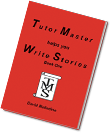
Stories written by young writers using Tutor Master helps you Write Stories Book 1
Examples of stories produced by young writers are set out as links to downloadable PDF files below.
Copyright is retained by the author of each piece and is reproduced here with their permission.
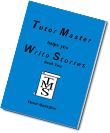
Stories written by young writers using Tutor Master helps you Write Stories Book 2
Examples of stories produced by young writers are set out as links to downloadable PDF files below.
Copyright is retained by the author of each piece and is reproduced here with their permission.

 Download this story
Download this story





